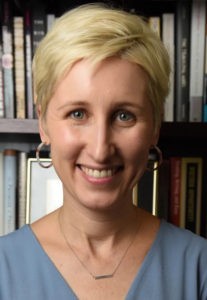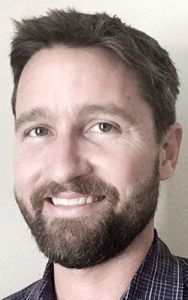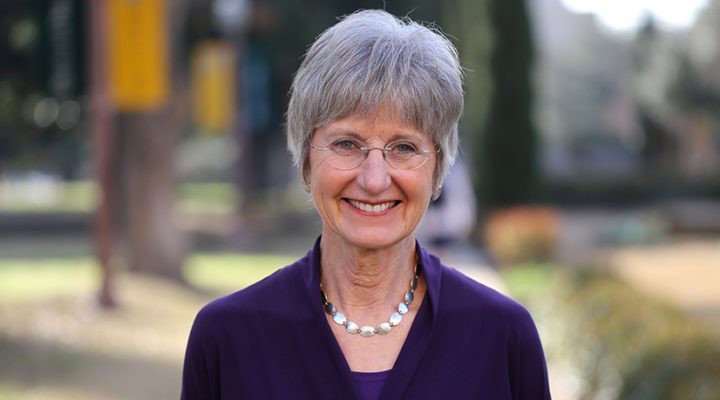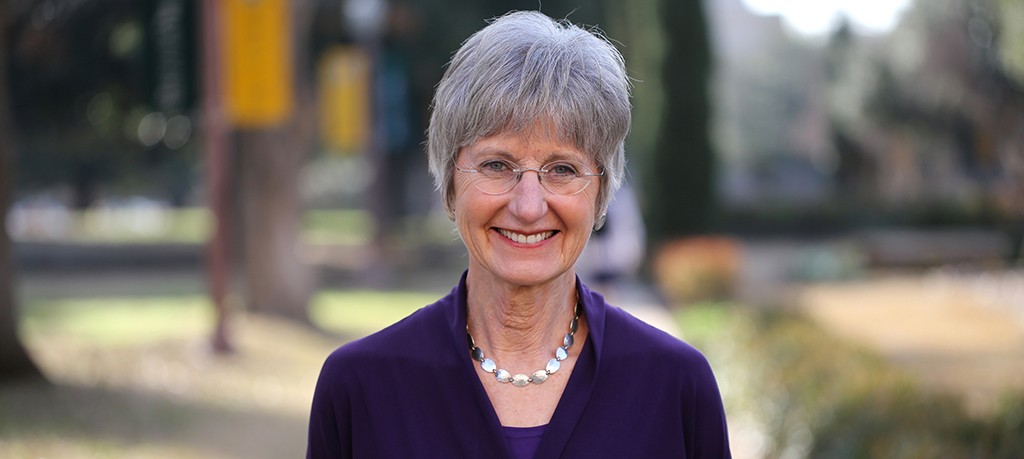Note: This story includes content about sexual abuse.
Siblings Sarah and John Garland share an intangible inheritance from their late mother that transcends kinship.
Sarah, a journalist, and John, a pastor, say their mother, Diana Garland, a Baptist social work educator with wide-ranging influence, pursued a commitment to justice and mercy that inspires them in their life and work.

Sarah Garland
“There’s not a lot required of us, the Bible says, but one (requirement) is to do justice,” said Sarah Garland, a New York-based writer and editor, during a Sept. 25 address to her home church in Louisville, Ky. Her mother “always appeared to be doing and doing” justice, she observed. “I feel both inspired and daunted.”
She and her brother delivered the William M. Johnson Lectures at Crescent Hill Baptist Church, the congregation they and their parents attended while living in Louisville. The focus of this year’s lectures, which are named for a longtime staff minister at Crescent Hill, was “Honoring the Legacy of Diana Garland: Serving the Least of These.” Due to the COVID-19 pandemic, the lectures were delivered via Zoom.
Diana Garland, who died from pancreatic cancer in 2015, was the second dean of the former Carver School of Church Social Work at Southern Baptist Theological Seminary, and the founding dean of Baylor University’s School of Social Work, which now bears her name.
“I am looking at her picture right now, and I keep her handwriting all over the place just to remind me,” said John Garland while sitting in his office in San Antonio, Texas. A prayer that she kept tucked in her Bible now resides on his desk.

John Garland
John serves as pastor of San Antonio Mennonite Church, a congregation with an outreach to asylum seekers who recently crossed the U.S.-Mexico border. It provides a supportive community, a safe place to stay, medical care and other resources.
Sarah and John were teenagers in 1995 when the relatively new president of Southern Seminary, Al Mohler, dismissed their mother from her deanship. The firing stemmed from a controversy surrounding Mohler’s insistence that only professors who oppose the ordination of women be added to the faculty.
In 1997, Diana’s husband, David, who was a New Testament professor at Southern, took a faculty position at Baylor University’s George W. Truett Theological Seminary. The family moved to Waco, Texas, and the following year Diana was hired by Baylor.
“They were hurt and, of course, pretty mad at the fundamentalists who took over Southern Seminary who forced out my mom and so many of their colleagues,” Sarah said. Yet the careers of both Garlands flourished at Baylor.
While Diana was leading the social work program, David was named dean of Truett Seminary a decade after arriving on campus. He also has served Baylor as interim provost and interim president on two occasions. Although retired from academic leadership, he still holds a faculty appointment at Truett Seminary.
The Garland children also have done well in their professions, but they chose vastly different vocational paths. The anger Sarah harbored as a result of her parents’ treatment at Southern caused her not to “set foot in a church for years,” she said. “Instead, I headed to New York City, far from my roots, intent on finding my own way to do justice in a messed-up world.”
The Garland children also have done well in their professions, but they chose vastly different vocational paths.
Her credits include two books, Divided We Fail, which deals with court-ordered desegregation in Louisville, and Gangs in Garden City, which is about transnational street gangs from Central America.
Prior to accepting his current position, John Garland, a graduate of Truett Seminary, was involved in ministry along the Texas-Mexico border.
In San Antonio, John and his congregation have served thousands of people who fled their home countries to escape poverty, violence and other desperate circumstances. They arrive at the church’s door experiencing severe trauma. John sees the transformation of trauma as being at the center of the Christian faith. “You know one word for that, one simple word for that is hessed,” said John, referring to the Hebrew word for mercy.
John emphasized that key symbols of Christianity — the Cross, baptism and Communion — represent violence, but they point people toward transformation and new life.
“In our hospitality ministry, we just say trauma is a trap,” John said. “It is as simple as that. Trauma is a trap.” Scripture, he noted, refers to traps as pits, mire, a cistern that has no lid and quicksand. “We have to be responsive to that as a faith movement.”
Key symbols of Christianity — the Cross, baptism and Communion — represent violence, but they point people toward transformation and new life.
At Baylor, Diana Garland, who for years was well known for her research on families, children and congregationally based social work, launched a new scholarly endeavor related to trauma. She started doing research on clergy sexual abuse against women.
However, most people did not know her underlying motivation for the research came from her own experience with a clergyman who abused his authority, Sarah Garland said.
The abuse happened at a religious institution where Diana worked between leaving Southern and going to Baylor, Sarah said. “The perpetrator was not only her boss, but someone she had turned to for spiritual support during the most traumatic time in her life. He abused that trust, and he abused her.”
He threatened to fire her and ruin her future employment prospects if she revealed what happened, Sarah said. “She later learned that he was a predator who had abused and was grooming other women.”
Sarah said her mother did not tell her about the abuse for several years. The abuse made a “devastating” and lasting impact on the entire family, Sarah said. “Yet out of that broken place my mom found a new calling.”
“Out of that broken place my mom found a new calling.”
“My mom’s research helped to expose a problem endemic to churches and religion more broadly, and to define it for what it was,” Sarah said. Diana discovered that pastors describe sexual abuse as “sin,” but that victims describe it as “evil.” Yet the main goal of the research, Sarah said, “was to help victims find healing and justice.”
For a decade, Diana wrote and spoke about the topic. Sara said her mother’s research involved listening to the stories of “dozens and dozens of women, many of whom she stayed in touch with long term.” One of those victims called the abuse “soul rape.”
Quoting from her mother’s research, Sarah said, “The trauma rips through her defenses so that she cannot react effectively, shattering her understanding of herself, her faith in the order of the world and the divine, injuring her ability to feel safe and to trust.”
Near the end of her address, Sarah shared excerpts from her mother’s final book, Why I Am a Social Worker, which was published the year she died.
In one passage, Diana Garland explained that Christian hope is a decision rather than a feeling. She wrote: “The decision for hope rests on what we believe at the deepest levels — what our most basic convictions are about the world and about God and about the future. We choose hope, not as a naïve wish, but as a choice with our eyes wide open to the reality of the world and our responsibility to be at work in it.”
Resources from Diana Garland on clergy sexual abuse:
When wolves wear shepherds’ clothing: Helping women survive clergy sexual abuse
The prevalence of clergy sexual advances toward adults in their congregations
Understanding and preventing clergy sexual misconduct with adults
Don’t call it an affair. Call it abuse of power
Related BNG articles:
Diana Garland, social work educator and bridge builder, dies
Baylor renames School of Social Work for Dean Diana Garland
Southern Baptists, power and the continuum of sexual violence | Opinion by Susan Shaw


